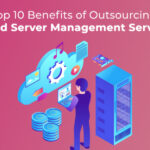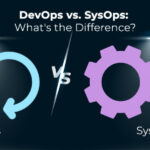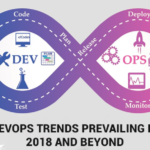What is a DevOps Tool?
Automating the software development process is possible with DevOps Tools. A major focus of the course is the communication and collaboration between product management, software development, and operations professionals. Additionally, DevOps tools enable teams to automate most software development processes, such as building, managing conflicts, managing dependencies, and deploying software.
We have compiled a list of the latest DevOps tools and technologies, along with their latest features and links to download them.
#1) Site24x7
DevOps and IT can monitor their entire infrastructure with Site24x7, a SaaS-based monitoring service. AppLogs from Site24x7 collects, consolidates, indexes, and analyzes logs from different sources, including servers, applications, network devices, log frameworks, and the cloud.
Features:
- Easy troubleshooting and filtering with query language-based search.
- With trend-based and count-based alert mechanisms, saved searches can be saved and alerts can be sent.
- Multiple file formats are supported, including JSON, TXT, ZIP, PDF, and CSV
- Monitoring of websites, real-time user monitoring, server monitoring, network monitoring, cloud monitoring, and application monitoring
- The software provides Web Page Speed, IT Automation, Centralized Log Data, Network Fault Management, and more
- Customers can contact the company via Chat, Email, Phone, or Contact Form
- Platforms supported: Windows, Linux, OSX, and FreeBSD
- Plan prices start at $35 per month.
- A 30-day free trial is available without a credit card.
| 👍 Pros | 👎 Cons |
| Log collection can be simplified | User interface needs to be improved |
| Cloud-based log management | Difficult to add their own custom plugins |
| Log management in an agile manner |
#2) JIRA
Its easy-to-use framework makes JIRA a popular tool for bug tracking among software professionals. JIRA is a commercial product used to manage team issues by capturing and organizing them, prioritizing them, and updating them. The tool integrates directly with code development environments, making it an ideal choice for developers. As it can track any type of issue, it is not just restricted to the software industry. Agile projects are supported. Compared to other tools, this tool comes with many add-ons that make it more powerful
Features:
- Feedback can be captured through screenshots or videos
- Collaborative teamwork at its best
- Schedule weekly and monthly scans
- Providing the option to customize workflows
- Java, Kotlin, Python, and Ruby are supported. Language used for programming
- In 1998, JIRA was founded
- Contact forms, tickets, and phone support are available
- Windows, Linux, and macOS are supported
- Starting at $7.75 per month, plans are available.
- 7-Day Free Trial
| 👍 Pros | 👎 Cons |
| User-friendly | Collaboration features are limited |
| Tasks, sub-tasks, spikes, and epics can be created | Challenges can arise during setup |
| Workflows can be customized with it |
#3) ManageEngine Applications Manager
DevOps administrators across a variety of industries use ManageEngine Applications Manager to monitor infrastructure and application performance. Large enterprise organizations will find Applications Manager to be an ideal solution that is both affordable and effective.
Features:
- One console for monitoring 150+ business applications and infrastructure elements, both on-premises and in the cloud.
- On-premises as well as cloud-based deployments are possible.
- Monitoring servers/applications automatically through a discovery process.
- Dynamic baselines and adaptive thresholds.
- Chat, email, and phone support are available
- Microsoft Windows, Linux, and Mac OS X are supported
- There is a $12 monthly fee for the basic plan. Discount of 10% on yearly payments.
- A free 30-day trial is available
| 👍 Pros | 👎 Cons |
| Tool that is easy to use | The documentation can be confusing for newbies when it comes to updating |
| Using the app, you can manage cloud infrastructures | Integration is limited |
| Provides prompt technical support |
#4) QuerySurge
The first-of-its-kind DevOps solution for continuous data testing, QuerySurge is a smart data testing solution.
Key Features
- API with more than 60 calls
- Provides rapid verification of large amounts of data
- Performs complex transformations between multiple target and source systems
- Updates tests according to changes in requirements and code, and alerts team members to the changes
- Analyzes and provides detailed data intelligence
- Programming language support for Java
- In 1996, QuerySurge was founded
- Request a quote from sales for price
- 15-Day Free Trial
| 👍 Pros | 👎 Cons |
| Integrates with a wide range of leading test management systems | There are a number of features that require a premium subscription. |
| Returns on investment (ROI) are significant | In automated pipelines, large datasets may cause delays. |
| Process for improving data quality should be sped up |
#5) Basis Technologies
DevOps and test automation platforms designed specifically for SAP are only available from Basis Technologies. By using their DevOps for SAP tool, ActiveControl, businesses can switch from fixed release cycles to an on-demand delivery model based on CI/CD and DevOps.
Key features:
- Including build, conflict/dependency management, and deployment, automate 90%+ of manual effort
- With 60+ automated analyzers that highlight risk, impact, and issues, shift quality left
- The BackOut function allows deployments to be rolled back
- Automates ECC and S/4 change management, alignment, and synchronization
- Approval process that is fully customizable
- Distributed teams can collaborate via a central web dashboard
- Support is available via Chat, Phone, and Contact Form
- Windows platform supported
- A monthly plan starts at $29 per month.
- 7-Day Free Trial
| 👍 Pros | 👎 Cons |
| User-friendly interface | Support is limited |
| Customization of workflows | In automated pipelines, large datasets may cause delays. |
| Integration of DevOps tools |
#6) Desktop Central
Administrators can manage applications, system settings, desktop settings, and security policies using Desktop Central. Through its collection feature, it is possible to deploy a group of configurations all at once. This UEM solution offers both traditional IT management and modern management features through a single console, as well as support for endpoint security add-ons.
Features:
- A computer-based and a user-based configuration is also available.
- Also available in Mac and Linux configurations.
- It is possible to track the status of the applied configurations at any time.
- Hundreds of ready-made custom script templates and 30 predefined configurations are available, ready to deploy at any time
- It is used by companies such as IKEA, HONDA, IBM, Xerox, Unicef, and BRIDGESTONE
- Email, phone, and a contact form are available for customer support
- Platforms supported: Windows, Android, iOS, Linux, and macOS
- Plans begin at $39 per month. An annual discount of 10% is available.
- A free 30-day trial is available
| 👍 Pros | 👎 Cons |
| Patches from more than 250 third parties | Add-on charges |
| Software deployment in an instant | There is limited functionality |
| Configurations that are predefined |
#7) Solarwinds DevOps
By implementing an agentless architecture, SolarWinds DevOps reduces server load. Using it, you can monitor the performance of your network, servers, and VMware, simplifying your daily tasks.
Features:
- The system allows you to maintain security and control while granting team members full access.
- Improve team access to database information
- Database performance monitoring information is accessible to DevOps teams.
- Supports hybrid environments, provides reports, and provides insights
- Autozone and other popular companies use it
- Customers can contact the company via Chat, Email, Phone, or Contact Form
- Platforms supported: Windows and Linux
- Monthly plans start at $79 per month.
- Trial period: 30 days
| 👍 Pros | 👎 Cons |
| Access to secure data | The pricing plans are not very cost-effective. |
| Monitoring of database performance 24×7 | |
| Configure access based on roles |
#8) Firewall Analyzer
Firewall Analyzer is a firewall log management software that analyzes firewall logs as well as security device logs. This software strengthens network security by analyzing firewall logs and managing policies.
Features:
- Detection of firewalls automatically
- Import firewall logs
- Multi-format support, including PDF, CSV, and XLS
- Monitoring services include cloud monitoring, server monitoring, application monitoring, network monitoring, and performance monitoring
- Offers log analysis, unlocks the real value of your security devices, and offers attractive TCO and rapid ROI
- Reports and insights are provided
- It is used by companies such as Check Point, Cisco, Juniper, Fortinet, and Palo Alto Networks
- Customer support is available via chat, email, and phone
- Windows, iOS, and Android platforms are supported
- Sales can provide you with a quote
- Trial period: 30 days
| 👍 Pros | 👎 Cons |
| Monitoring of VPN and proxy servers in real-time | There is a little complexity |
| Custom reports can be created | It’s a little difficult to use the analyzer’s UI |
| Interface that is easy to use |
#9) Jenkins
Monitoring the execution of repetitive tasks is possible with Jenkins, a DevOps tool. One of the best software deployment tools, it helps to find issues more quickly so that changes can be integrated more easily into projects.
Features:
- Automation scales up as a result
- It is easy to update Jenkins with its built-in GUI tool and requires little maintenance.
- In addition to supporting continuous integration, it also supports continuous delivery
- The company offers plugins such as Ascii Art Magician, BeVigil CI, Gerrit Checks API, zdevops, 1Password, and WXWork
- An easy-to-use web interface makes it easy to set up and configure
- Programming languages supported include Java, JavaScript, Groovy, Golang, Ruby, and Shell scripts
- Concurrency can be increased by distributing tasks across multiple machines.
- In 2004, Jenkins was founded
- Telephone support is provided by the company
- Linux, FreeBSD, Gentoo, macOS, and OpenBSD are supported
- Sales can provide you with a quote
- 7-Day Free Trial
| 👍 Pros | 👎 Cons |
| A server for automation that is open source | Interface that is outdated |
| An architecture based on the cloud is supported | It is difficult to install and configure |
| There are many plugins available |
#10) PagerDuty
With PagerDuty, businesses can enhance their brand reputation through DevOps. It supports continuous delivery strategies through incident management. Furthermore, it enhances the performance of apps developed by DevOps teams.
Key Features:
- Escalations can be scheduled and automated
- Identify and monitor critical systems and applications
- Development through production can be easily detected and resolved
- The system offers real-time collaboration and user reporting
- A reliable and rich alerting system
- Integrate seamlessly with Slack, Zapier, AWS, ServiceNow, Salesforce, Zendesk, Atlassian, and DATADOG
- Email alerts are provided instantly
- Multi-format support, including CSV and JSON
- The price of a plan starts at $25 a month. Discount of 16% on yearly payments.
- 14-Day Free Trial
| 👍 Pros | 👎 Cons |
| Tool that is easy to use | Audit logs are not kept |
| Smart notification features | There is no self-hosted version |
| Managing multiple schedules |
Conclusion
DevOps aims to bridge the gap between Business, Development, and IT with the objective of converting your SDLC into a strategic resource. In order to achieve this goal, it is critical to choose the right tools. By optimizing your productivity, increasing transparency, reducing the time it takes for your products and services to reach the market, and improving your KPIs like code throughput and reliability metrics, the right tools actualize all of the benefits of DevOps. We have compiled a comprehensive list of DevOps tools to help you understand this landscape.
Nevertheless, even after implementing DevOps tools, operational maturity is not something that can be achieved
overnight. For more information contact Instacarma.
















